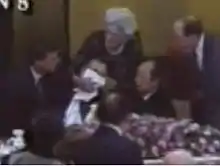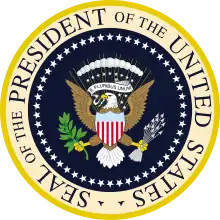George H. W. Bush vomiting incident
On January 8, 1992, about 8:20 p.m JST, while attending a banquet hosted by the Prime Minister of Japan, Kiichi Miyazawa, U.S. President George H. W. Bush fainted after vomiting in Miyazawa's lap. Doctors have since attributed the incident to a case of acute gastroenteritis.

History
George H.W. Bush began 1992 with a 12-day trade oriented trip to Asia and the Pacific to discuss readjusting the United States economic relations and policies to represent the end of the Cold War.[1] On January 8, 1992, Bush played a doubles tennis match with the Emperor of Japan Akihito and his son the Crown Prince Naruhito. The Emperor and Crown Prince beat Bush and his partner, a former U.S. ambassador to Japan.[2] That evening, Bush attended a state event for 135 diplomats held at the Japanese Prime Minister's residence. The president, scheduled to give remarks at the dinner, fainted in his chair between the second and third courses and vomited in the lap of the Prime Minister. Barbara Bush rushed to her husband and held a napkin to his mouth until the Secret Service took over. Bush, on the ground, quipped to his personal physician, Dr. Burton Lee, "Roll me under the table until the dinner's over." [3] The president regained consciousness, assured the dinner guests that it was just the flu, and exited the event for the evening. First Lady Barbara Bush gave a speech following dinner in place of the president:
I can't explain what happened to George because it never happened before. But I'm beginning to think it's the Ambassador's fault. [Laughter] He and George played the Emperor and the Crown Prince in tennis today, and they were badly beaten. And we Bushes aren't used to that.[2]
The following day, January 9th, 1992, the president's spokesman, Marlin Fitzwater, assured the public that Mr. Bush had a common intestinal flu and insisted he was feeling fine.[4] That afternoon, the President held a news conference with the Japanese Prime Minister at the Akasaka Palace. [5]
Effects of the incident
The incident was widely reported,[4] coming just weeks before the New Hampshire Primary, and quickly became fodder for the nation's comedians. Footage of the President vomiting was broadcast on the ABC network. The incident was parodied by Saturday Night Live[3] with a mock documentary featuring Barbara Bush trying to escape by crawling across the table.[6]
Shortly after the incident, an Idaho man, James Edward Smith, called CNN posing as the president's physician and claimed that Bush had died. A CNN employee entered the information into a centralized computer used by both CNN and sister network CNN Headline News, and Headline News nearly aired it before it could be verified. Smith was subsequently questioned by the Secret Service and hospitalized at a private mental health facility for evaluation.[7]
In Japan, even several years later, Bush was remembered for this event.[8] According to the Encyclopedia of political communication, "The incident caused a wave of late night television jokes and ridicule in the international community, even coining Busshu-suru (ブッシュする[9]) which literally means 'to do the Bush thing'."[10]
In 1993, the incident was spoofed in the comedy film Hot Shots! Part Deux.[11] According to a 2007 listicle published by USA Today, the incident was one of the top "25 memorable public meltdowns that had us talking and laughing or cringing over the past quarter-century."[12]
The incident was later mentioned by Hank Hill in the "Pilot" episode of the TV series "King Of The Hill", in which he states that "Detroit hadn't felt any real pride since George Bush visited Japan and vomited on their auto-executives." It was also briefly referenced in Season 7, Episode 13 of The Simpsons in which George Bush moves next door to the family. Whilst strangling Homer, he remarks "I'll ruin you like a Japanese Banquet!"
See also
References
- "Publication Papers of the Presidents of the United States: George H. W. Bush (1992, Book I)" (PDF). govinfo.gov. United States Government Publishing Office. 1992. Archived (PDF) from the original on January 18, 2021. Retrieved November 8, 2020.
- "1992 Public Papers 52- Text of Remarks at the State Dinner Hosted by Prime Minister Kiichi Miyazawa of Japan in Tokyo". U.S. Government Publishing Office. January 8, 1992. Retrieved November 8, 2020.
- McDaniel, Ann (January 8, 2017). "25 Years Ago Today, George H.W. Bush Vomited on the Prime Minister of Japan". Newsweek.
- Wines, Michael (January 9, 1992). "Bush Collapses at State Dinner With the Japanese". New York Times. Archived from the original on September 28, 2009. Retrieved August 28, 2009.
President Bush fell suddenly ill and collapsed at a state dinner being given for him Wednesday night at the home of the Japanese Prime Minister.
- "Public Papers - George Bush Library and Museum". bush41library.tamu.edu. Retrieved November 8, 2020.
- "Bad Sushi - YouTube". www.youtube.com. Retrieved November 8, 2020.
- McDougal, Dennis (January 10, 1992). "CNN Averts Hoax About Bush's 'Death'". Los Angeles Times. Archived from the original on January 31, 2013. Retrieved April 13, 2013.
- Peter McKillop, "Letter from Japan: Back to the Future: Will George W. Bush carry on his father's (barfing) legacy?, Time Asia found at Time Asia archives Archived 2009-04-12 at the Wayback Machine. Accessed September 19, 2009.
- Fallows, James (October 19, 2009). "More on US presidents as Japanese words". The Atlantic. Retrieved November 8, 2020.
- Hersh, Brandon Jay (2008). "Bush, George H. W. (1924– )". In Kaid, Lynda Lee; Holtz-Bacha, Christina (eds.). Encyclopedia of Political Communication. 1. SAGE. p. 72. ISBN 978-1-4129-1799-5.
- Kevin Jackson (August 16, 1993). "FILM / It's not hot and there's no shots in it: Hot Shots: Part Deux] is the latest exercise in movie parody from Jim Abrahams. Kevin Jackson met him". The Independent. Archived from the original on September 2, 2018. Retrieved September 2, 2018.
- Keen, Judy (May 7, 2007). "They did what, said what?". USA Today. Archived from the original on April 16, 2012. Retrieved August 28, 2017.
.jpg.webp)
